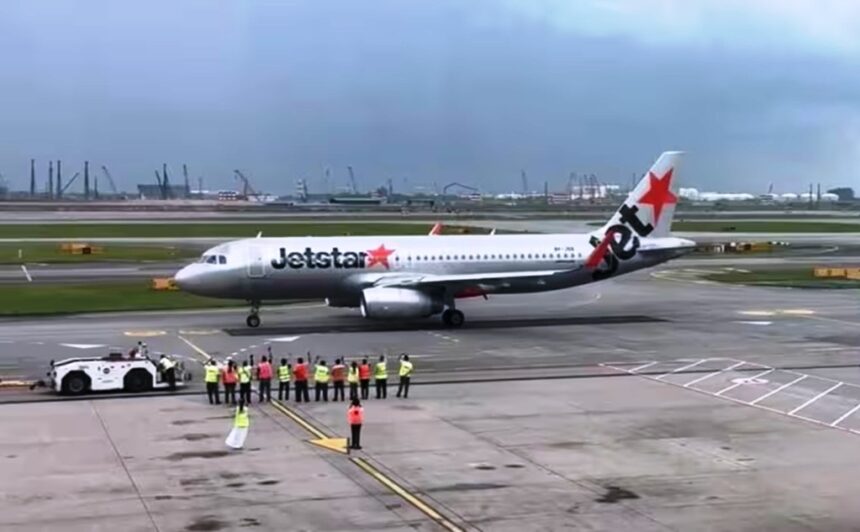SINGAPORE— As daylight faded at Changi Airport, Jetstar Asia’s last service, flight 3K764 from Manila, landed at 9:30 p.m. This event brought an emotional end to the airline’s two-decade journey in low-cost travel.
On the runway, staff waved, some shed tears, and cabin crew blew kisses as they said goodbye. Travellers, among them former CEO John Simeone, joined in to pay tribute to the carrier that helped make air travel more accessible across Asia.
In 2024 alone, Jetstar Asia flew 2.3 million customers, a sign of just how many people relied on its affordable fares.
Established in December 2004, Jetstar Asia began as part of the Qantas Group’s plan to tap into Asia’s growing market for budget flights. Based at Changi, with Westbrook Investments holding 51 percent and Qantas 49 percent, the airline aimed to give Singaporeans and others in the region cheaper ways to visit nearby destinations.
From the very first flight, Jetstar Asia expanded to serve 16 destinations, linking Singapore with places like Bangkok, Bali and Okinawa. By 2011, annual passenger numbers reached 2.7 million, and the airline regularly filled over 75 percent of its seats. Its 13 Airbus A320 aircraft became a common sight, delivering straightforward travel and friendly service with a Singaporean touch.
Jetstar Asia’s Demise
Despite early success, rising costs challenged Jetstar Asia’s survival. Supplier prices jumped, some by 200 percent, while airport charges stayed high. Competition from Scoot and AirAsia only made it harder to keep fares low. The airline faced ongoing losses, including a projected A$35 million shortfall for the 2025 financial year.
Earlier, it had reported losses of S$165.4 million in 2021 and S$37.2 million in 2022. Vanessa Hudson, CEO of Qantas Group, described the decision to close as “very tough”, explaining that the airline could not continue under current conditions. The closure allows Qantas to direct A$500 million into updating its fleet, with Jetstar Asia’s planes moving to routes in Australia and New Zealand.
News of the closure on 11 June 2025 left many travellers confused and disappointed. Some had just booked trips. Tan, a university student aged 23, told AsiaOne she was unsure if she would get a full refund for her Bali holiday. Another passenger, Megan, had bought tickets to Bangkok only hours before the announcement.
On X, some expressed sadness that there would be no more direct flights from Singapore to Okinawa. Others thanked Jetstar Asia for making budget travel possible. Figures from CARMA showed a sharp drop in positive sentiment after the news, with worried customers asking about refunds and questioning why bookings were still open after the closure date.
On Jetstar Asia’s final day, the mood at Changi was a mix of sadness and pride. Chief pilot Nico Van Der Schyff, who flew the last outbound flight to Kuala Lumpur, called the closure a shock but spoke of the strong sense of teamwork among staff.
Long-serving cabin crew like Norazman Sapiie, who worked at the airline for 20 years, gave a moving message as the final flight arrived: “Cabin crew, for one last time, let’s go home.” Crowds at Terminal 4 cheered for the airline, and Norazman was greeted with hugs and requests for photos. Travellers received small keepsakes, such as shopping bags from Labuan Bajo and model planes from Manila, as reminders of the airline’s legacy.
The shutdown affects more than just passengers. Over 500 staff face job losses. Still, more than half of their 900 job applications have led to interviews or offers, with many finding opportunities in airport lounges and tourism.
The National Trades Union Congress is supporting those affected, working with Singapore Airlines Group to help place staff in new roles. Customers with bookings after 31 July will get full refunds, with some offered flights on other Qantas Group airlines. Refunds for Club Jetstar memberships and vouchers will start in August.
With Jetstar Asia’s orange planes now missing from Changi, there’s a gap in the region’s budget airline market. Scoot and AirAsia may take over some routes, but many feel the loss of an airline that meant so much.
Former CEO Pasupathi, who joined the last flight, summed it up: “I wanted to be there for the people.” For many in Singapore, Jetstar Asia was more than a way to travel—it was the start of many adventures, now brought to an end.














